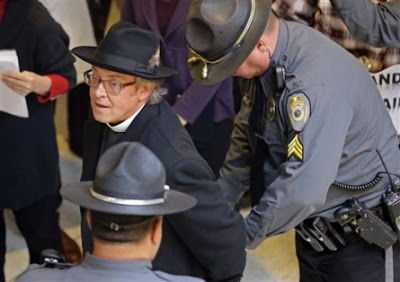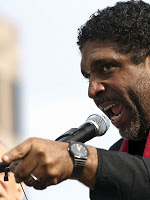 |
| Demonstrator being arrested during a protest at the Legislative Building in Raleigh, N.C., Monday, May 6, 2013. Photo by Gerry Broome / AP. |
‘Moral Monday’:
Diverse NAACP-led movement
‘achieves mass’ in North Carolina
“When I got to an A.M.E. [African Methodist-Episcopal] church for a meeting called by the NAACP and saw that 70 percent of my audience was white, I knew that something was happening in North Carolina!” — Rev. William Barber
By Dick J. Reavis | The Rag Blog | June 6, 2013
RALEIGH, North Carolina — Four weeks ago, on Monday, April 29, an encouraging but puzzling progressive movement was born in an unlikely locale, North Carolina.
It calls itself “Forward Together” or sometimes, “Moral Monday.” It is led by the National Association for the Advancement of Colored People (NAACP) and it began when a group of 17, thoroughly integrated by age, sex, and race, refused to disperse during a protest inside the state’s General Assembly.
The “Moral Monday” protests have continued, and, at last notice, are gaining ground. On June 3, as a crowd estimated as high as 1,600 gathered, 151 demonstrators repeated the offense of the 17, bringing the total number of arrests to 309.
Most media observers believe that when and if the total surpasses 500, the campaign will attract significant national attention. Already the local press has got it right. “Moral Monday Achieves Mass” said the headline on a June 4 front-page story in the Raleigh News & Observer.
The movement is unquestionably onto something, but it’s also a puzzler in several ways. In the context of state politics, it is essentially a racial and Democratic rising. In 2008, by the narrowest of margins, a majority of North Carolinians voted to elect Barack Obama. The state hadn’t gone Democratic in a national election since 1976. The outcome was in part a reflection of racial demography: African Americans account for 22 percent of the state’s population, nine points above the national average.
North Carolina had long been governed by “moderate” Democrats, but Obama’s victory set off a white backlash that led to twin Republican victories, first in 2010 legislative races. In 2012, the state favored Romney and gave the GOP — including numerous economic libertarians and Tea Party cranks — veto-proof strength in both its legislative chambers.
Pat McCrory, an ostensibly business-as-usual Republican and mayor of Charlotte, the “Wall Street of the South,” won the governor’s race — and immediately revealed an alliance with the ultra-right.
In a virtual blitzkrieg of activity, the General Assembly has passed or soon will pass bills whose consequences will upset almost everyone: measures to shorten the duration and amount of unemployment insurance payments, to impose a sales tax on medicines and groceries, and to abolish an enrollment cap on elementary classrooms.
Measures nixing federal funds to expand Medicaid, requiring voter IDs, and trimming voting hours are a part of the package, as is a bill to abolish inheritance taxes on estates of more than $5 million. The ultra-right’s push has suffered only one setback: a bill declaring Christianity as the state’s official religion didn’t get out of committee.
 |
| Rev. William Barber. |
North Carolina is the least-unionized state in the nation and its white Democrats are led by Blue Dogs; fervent opposition wasn’t expected and hasn’t come from either quarter. Inspiration has instead come from the Rev. William Barber, an African-American backcountry preacher, not so polished as the grave and decorous Martin Luther King, but nearly as rousing, more eclectic or inclusive, and, odd as it may seem — funnier!
Barber is a Baptist who, noting that one of the legislative proposals currently threatening the state is called House Bill 666, quipped that, “Some of y’all liberals won’t believe me, but I believe that even the computers numbering those bills are guided by the Word of God!” But Monday he turned his podium over to an LGBT spokesperson — a white lesbian mother whose partner is black. Barber’s style may be archaic, but his message isn’t, as the old song says, “Gimme that old-time religion / It’s good enough for me.”
Internally, Barber’s movement is more akin to King’s Southern Christian Leadership Conference (SCLC) — with an emphasis on “Christian” and “Leadership” — than to that of the Student Nonviolent Coordinating Committee (SNCC) or Students for a Democratic Society (SDS).
The freewheeling debates of the Occupy movement, in which even fools could speak, are not a part of the scene. Instead, a coterie, including legendary white civil rights worker Bob Zellner and lawyer Al McSurely — an organizer whose home was in 1967 bombed by the sheriff’s department in Harlan County, Kentucky — plan what the movement will do from day to day.
The puzzling thing is that the response to their call has not been what anyone anticipated. While rallies in support of the cause are more representative of the state’s population, most of the movement’s arrestees — including this reporter — have been whites older than 50, most of them, college-educated — Mother Jones and MSNBC fans. Physicians, professors, and even a few locally-elected officials are in their ranks.
Ten days ago, to build support for Moral Monday, Barber and his closest aides began a statewide speaking tour. “When I got to an A.M.E. [African Methodist-Episcopal] church for a meeting called by the NAACP and saw that 70 percent of my audience was white, I knew that something was happening in North Carolina!” Barber declared. But he wasn’t speaking in what we call “all seriousness”: he was noting an irony that puzzled, and maybe amused him, too.
Nobody has yet been able to fully explain the arrest-sheet demographics. Cuts in unemployment insurance don’t take effect until July 1: maybe the unemployed don’t yet know what’s in store, some people say. Others point out that today mugshots of the arrestees are posted within hours on the Internet, from which they are universally available, maybe forever.
Twenty years ago, only lawmen could tap such information electronically. Knowing this, college students are justifiably afraid that an arrest record will follow them for the rest of their lives. A few people complain about the dominance of god talk in Moral Monday speeches, but outspoken atheists are still beyond the pale here.
The commentary is not always doubtful, however. Ever since the fall of Reconstruction, a consensus has prevailed among Southern radicals. The greatest obstacle to the region’s progress, they’ve said, has been that whites were unwilling to follow black leadership. Barber’s rise as the head of a mostly white army has broken that taboo.
Because its demographics are new and could shift in unpredictable ways, no one is really predicting Moral Monday’s future, and I think there’s a good reason why. Nearly 50 years ago, I was an SCLC volunteer. One of my first duties was to redirect traffic from a parking lot at one venue to another, for a speech by Dr. King.
I resented the assignment because it meant that I wouldn’t get to hear him. But when I complained to a veteran field staffer, he imparted a bit of wisdom that’s still good coin. “Dr. King and them aren’t going to talk about anything but where the Movement is going,” he said. “But if anybody knew, this wouldn’t be a movement!”
[Dick J. Reavis is an associate professor of English at North Carolina State University. A former senior editor at Texas Monthly magazine and the author of six books, Reavis was a contributor to the original Rag in Austin and was active in the civil rights and anti-war movements. He may be reached at dickjreavis@yahoo.com. Read more articles by Dick J. Reavis on The Rag Blog.]

















